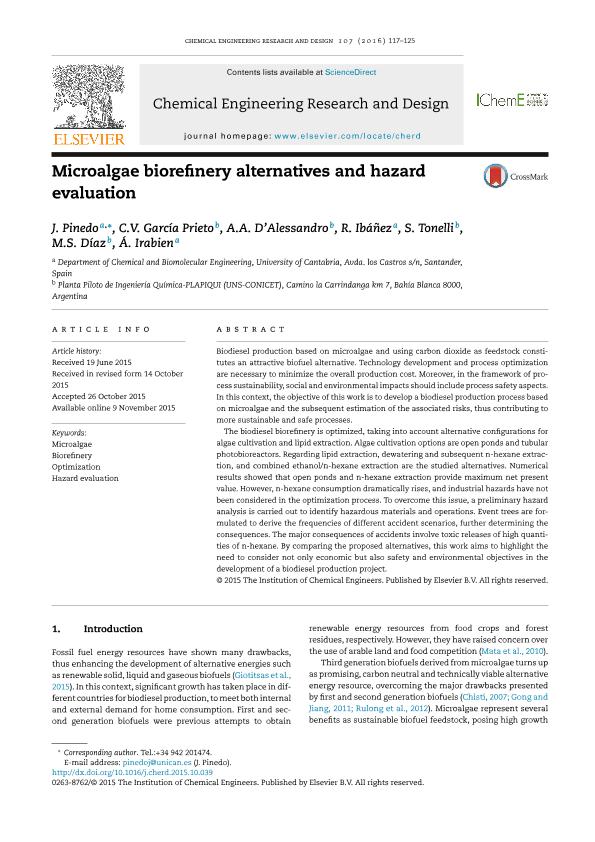Artículo
Microalgae Biorefinery Alternatives And Hazard Evaluation
Pinedo, J.; García Prieto, Carla Valeria ; D'alessandro, Agustín Alejo
; D'alessandro, Agustín Alejo ; Ibañez, R.; Tonelli, Stella Maris
; Ibañez, R.; Tonelli, Stella Maris ; Díaz, María Soledad
; Díaz, María Soledad ; Irabien, A.
; Irabien, A.
 ; D'alessandro, Agustín Alejo
; D'alessandro, Agustín Alejo ; Ibañez, R.; Tonelli, Stella Maris
; Ibañez, R.; Tonelli, Stella Maris ; Díaz, María Soledad
; Díaz, María Soledad ; Irabien, A.
; Irabien, A.
Fecha de publicación:
11/2015
Editorial:
Elsevier
Revista:
Chemical Engineering Research & Design
ISSN:
0263-8762
Idioma:
Inglés
Tipo de recurso:
Artículo publicado
Clasificación temática:
Resumen
Biodiesel production based on microalgae and using carbon dioxide as feedstock constitutes an attractive biofuel alternative. Technology development and process optimization are necessary to minimize the overall production cost. Moreover, in the framework of process sustainability, social and environmental impacts should include process safety aspects. In this context, the objective of this work is to develop a biodiesel production process based on microalgae and the subsequent estimation of the associated risks, thus contributing to more sustainable and safe processes.The biodiesel biorefinery is optimized, taking into account alternative configurations for algae cultivation and lipid extraction. Algae cultivation options are open ponds and tubular photobioreactors. Regarding lipid extraction, dewatering and subsequent n-hexane extraction, and combined ethanol/n-hexane extraction are the studied alternatives. Numerical results showed that open ponds and n-hexane extraction provide maximum net present value. However, n-hexane consumption dramatically rises, and industrial hazards have not been considered in the optimization process. To overcome this issue, a preliminary hazard analysis is carried out to identify hazardous materials and operations. Event trees are formulated to derive the frequencies of different accident scenarios, further determining the consequences. The major consequences of accidents involve toxic releases of high quantities of n-hexane. By comparing the proposed alternatives, this work aims to highlight the need to consider not only economic but also safety and environmental objectives in the development of a biodiesel production project.
Palabras clave:
Microalgae
,
Biorefinery
,
Optimization
,
Hazard Evaluation
Archivos asociados
Licencia
Identificadores
Colecciones
Articulos(PLAPIQUI)
Articulos de PLANTA PILOTO DE INGENIERIA QUIMICA (I)
Articulos de PLANTA PILOTO DE INGENIERIA QUIMICA (I)
Citación
Pinedo, J.; García Prieto, Carla Valeria; D'alessandro, Agustín Alejo; Ibañez, R.; Tonelli, Stella Maris; et al.; Microalgae Biorefinery Alternatives And Hazard Evaluation; Elsevier; Chemical Engineering Research & Design; 107; 11-2015; 117-125
Compartir
Altmétricas



